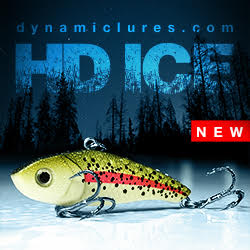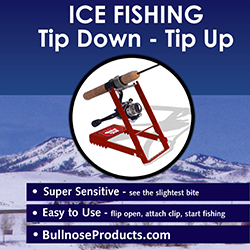|
This section allows you to view all posts made by this member. Note that you can only see posts made in areas you currently have access to.
Messages - Casey Waldorf
1
« on: February 10, 2011, 03:49:30 PM »
Wow nice fish. Turkey09 you going to the tournament in Mosquito Lake this Saturday?
2
« on: February 10, 2011, 03:44:43 PM »
Ice Augers that is, From new to experienced. Be very careful changing your auger blades they are very sharp I just leaned my lesson,  lol it's just a nik ill live.
3
« on: February 09, 2011, 06:09:17 PM »
MDB you are more then welcome to join us Sunday at 10:00 o'clock in the morn. I got a spot where we should hit some gill & crappies. Just let me know.
4
« on: February 08, 2011, 03:07:50 PM »
After the tournament Saturday. On Sunday around 10:00 o'clock I will be taking a first timer out on the ice at mosquito going off 305 if anybody would like to come. Can't wait to see him get his first fish thur the ice. 
5
« on: February 07, 2011, 07:47:42 AM »
I Live right next to Lake Milton, I will try to be as helpful as i can.
6
« on: February 07, 2011, 07:40:40 AM »
Triton189 & Sir Fishalot if you have not went yet I can take you guys. Even if you did go already I will still go up there with you guys. If you have not done so already you will need a Pa license & a Erie permit. Just let me know.
7
« on: February 06, 2011, 04:02:15 PM »
This fish cleaning system works great. Especially if you have caught a lot of panfish. Saves on time. 
8
« on: February 06, 2011, 03:57:42 PM »
Congrats. 
9
« on: February 05, 2011, 04:04:36 PM »
The Crout was good to. lol.
10
« on: February 05, 2011, 03:44:51 PM »
11
« on: February 05, 2011, 03:10:07 PM »
Thought some people might want to know this.
What Are Parasites?
Parasites are living things that live off other living things. The fleas on a fox, the worms in your cat, and the gut-busting microorganisms you boil or filter out of your water when camping are all parasites. They are arguably among the most successful animals on Earth.
To anybody who is fascinated by the diversity of life, it doesn't get any better than parasites. Many have elaborate life cycles during which they change form and move from one animal to another. They tolerate a wide range of environmental conditions. They can produce tremendous numbers of young. And they have a variety of amazing adaptations that help them find, hang onto, and draw sustenance from other creatures.
Here are a few of the most common and most visible fish parasites.
Black Spot Disease, Uvulifer ambloplitis
Have you ever caught a fish that looked like someone had sprinkled it with coarse-ground pepper? You were likely looking at black spot disease, caused by the larval stage of certain flukes that live as adults in fish-eating birds. Any fish can become infected. The most frequently infected are sunfish, yellow perch, northern pike, bass, and other fish that live in shallow water and vegetated areas where birds and snails are found.
Life Cycle: 1 The adult fluke lives in the digestive tract of fish-eating birds, typically kingfishers or herons. It produces eggs, which pass from the bird in its droppings. The eggs hatch in water, liberating larvae called miracidia that swim around until they encounter a snail.
2 After digging their way into the snail, the miracidia form mother sporocysts. Mother sporocysts produce sporocysts that invade the snail's liver. In about six weeks, each sporocyst produces another form called a cercaria.
3 Cercariae emerge from the snail into the water. They seek out a fish and penetrate its flesh, forming cysts just under the skin and in the flesh.
4 If a bird eats infected fish, the parasites leave the cysts and mature in the digestive tract of the bird, starting the cycle again.
Effects on Fish: Black spot is rarely fatal to fish. A heavy infection may make a fry's eyes bulge. If heavily infected fish live in stressful conditions (poor nutrition, injury, crowding, etc.), they could die.
Effects on People: Black spot disease is not harmful to humans. However, you may find the spots unappetizing. Your best bet is simply to remove the skin and cysts in the flesh before cooking the fish.
12
« on: February 05, 2011, 03:06:02 PM »
Thought some people might want to know this.
What Are Parasites?
Parasites are living things that live off other living things. The fleas on a fox, the worms in your cat, and the gut-busting microorganisms you boil or filter out of your water when camping are all parasites. They are arguably among the most successful animals on Earth.
To anybody who is fascinated by the diversity of life, it doesn't get any better than parasites. Many have elaborate life cycles during which they change form and move from one animal to another. They tolerate a wide range of environmental conditions. They can produce tremendous numbers of young. And they have a variety of amazing adaptations that help them find, hang onto, and draw sustenance from other creatures.
Here are a few of the most common and most visible fish parasites.
Black Spot Disease, Uvulifer ambloplitis
Have you ever caught a fish that looked like someone had sprinkled it with coarse-ground pepper? You were likely looking at black spot disease, caused by the larval stage of certain flukes that live as adults in fish-eating birds. Any fish can become infected. The most frequently infected are sunfish, yellow perch, northern pike, bass, and other fish that live in shallow water and vegetated areas where birds and snails are found.
Life Cycle: 1 The adult fluke lives in the digestive tract of fish-eating birds, typically kingfishers or herons. It produces eggs, which pass from the bird in its droppings. The eggs hatch in water, liberating larvae called miracidia that swim around until they encounter a snail.
2 After digging their way into the snail, the miracidia form mother sporocysts. Mother sporocysts produce sporocysts that invade the snail's liver. In about six weeks, each sporocyst produces another form called a cercaria.
3 Cercariae emerge from the snail into the water. They seek out a fish and penetrate its flesh, forming cysts just under the skin and in the flesh.
4 If a bird eats infected fish, the parasites leave the cysts and mature in the digestive tract of the bird, starting the cycle again.
Effects on Fish: Black spot is rarely fatal to fish. A heavy infection may make a fry's eyes bulge. If heavily infected fish live in stressful conditions (poor nutrition, injury, crowding, etc.), they could die.
Effects on People: Black spot disease is not harmful to humans. However, you may find the spots unappetizing. Your best bet is simply to remove the skin and cysts in the flesh before cooking the fish.
13
« on: February 05, 2011, 03:00:06 PM »
Had a great time at Wingfoot. It was great to see and get to know some of you, hope to see some of you guys in the future. And thank you to (Hardwaterjunkie) For putting on a fun day. And thank you to (Slabjunkie) for the tips and tricks it was very helpful hope to fish with you anain.
14
« on: February 02, 2011, 09:09:59 PM »
Your right John working mid-nights does throw you off a bit.
15
« on: February 02, 2011, 08:59:24 PM »
@ Snow, my son showed me a thing or too. I caught this fish here but when I watched my son pull his first fish out off the ice man was that pricessless.
| 









|
|